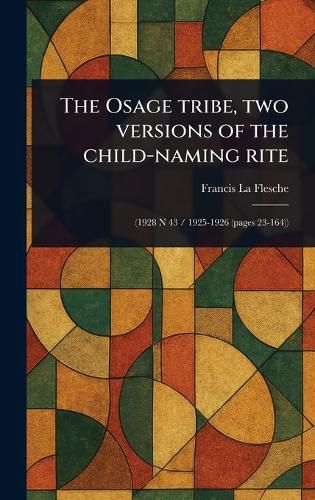Readings Newsletter
Become a Readings Member to make your shopping experience even easier.
Sign in or sign up for free!
You’re not far away from qualifying for FREE standard shipping within Australia
You’ve qualified for FREE standard shipping within Australia
The cart is loading…






This title is printed to order. This book may have been self-published. If so, we cannot guarantee the quality of the content. In the main most books will have gone through the editing process however some may not. We therefore suggest that you be aware of this before ordering this book. If in doubt check either the author or publisher’s details as we are unable to accept any returns unless they are faulty. Please contact us if you have any questions.
Explore the rich cultural heritage of the Osage Nation in "Osage tribe, two versions of the child-naming rite," by Francis La Flesche. This meticulously prepared republication delves into the heart of Osage tradition, presenting detailed accounts of the child-naming rite, a cornerstone of Osage society and identity.
La Flesche, himself of Osage descent, offers invaluable ethnographic insights into the tribe's mythology and spiritual practices. This volume contains two distinct versions of the rite, recorded between 1925 and 1928, providing a comprehensive understanding of this sacred ceremony.
A significant contribution to Native American studies, this work illuminates the profound connection between the Osage people and their ancestral beliefs. Discover the enduring power of Osage mythology as revealed through this essential historical text. Perfect for those interested in Indigenous studies, religion, and Native American history.
This work has been selected by scholars as being culturally important, and is part of the knowledge base of civilization as we know it.
This work is in the public domain in the United States of America, and possibly other nations. Within the United States, you may freely copy and distribute this work, as no entity (individual or corporate) has a copyright on the body of the work.
Scholars believe, and we concur, that this work is important enough to be preserved, reproduced, and made generally available to the public. We appreciate your support of the preservation process, and thank you for being an important part of keeping this knowledge alive and relevant.
$9.00 standard shipping within Australia
FREE standard shipping within Australia for orders over $100.00
Express & International shipping calculated at checkout
Stock availability can be subject to change without notice. We recommend calling the shop or contacting our online team to check availability of low stock items. Please see our Shopping Online page for more details.
This title is printed to order. This book may have been self-published. If so, we cannot guarantee the quality of the content. In the main most books will have gone through the editing process however some may not. We therefore suggest that you be aware of this before ordering this book. If in doubt check either the author or publisher’s details as we are unable to accept any returns unless they are faulty. Please contact us if you have any questions.
Explore the rich cultural heritage of the Osage Nation in "Osage tribe, two versions of the child-naming rite," by Francis La Flesche. This meticulously prepared republication delves into the heart of Osage tradition, presenting detailed accounts of the child-naming rite, a cornerstone of Osage society and identity.
La Flesche, himself of Osage descent, offers invaluable ethnographic insights into the tribe's mythology and spiritual practices. This volume contains two distinct versions of the rite, recorded between 1925 and 1928, providing a comprehensive understanding of this sacred ceremony.
A significant contribution to Native American studies, this work illuminates the profound connection between the Osage people and their ancestral beliefs. Discover the enduring power of Osage mythology as revealed through this essential historical text. Perfect for those interested in Indigenous studies, religion, and Native American history.
This work has been selected by scholars as being culturally important, and is part of the knowledge base of civilization as we know it.
This work is in the public domain in the United States of America, and possibly other nations. Within the United States, you may freely copy and distribute this work, as no entity (individual or corporate) has a copyright on the body of the work.
Scholars believe, and we concur, that this work is important enough to be preserved, reproduced, and made generally available to the public. We appreciate your support of the preservation process, and thank you for being an important part of keeping this knowledge alive and relevant.